|
|
|
Sort Order |
|
|
|
Items / Page
|
|
|
|
|
|
|
| Srl | Item |
| 1 |
ID:
188432
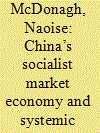

|
|
|
|
|
| Summary/Abstract |
There is growing debate over whether China’s economic model can be managed within the rules of the multilateral trade system, a debate with major implications for international order. Critics argue that the China model is a systemic rival to the liberal trade order, a view that implies future decoupling. For those who reject the rivalry view, the default position is to propose more trade agreements with China, with the goal of driving liberal reforms in the country. This article engages the debate by contributing a conceptually informed and empirically supported analysis of China’s institutional development. Combining ‘second image’ insights with a comparative capitalism framework helps explain why nations evolve distinct varieties of market economy, which then shape their multilateral preferences. Applying these insights to China’s institutional development suggests two things: (1) the country is in transition to a socialist, rather than liberal, market economy, grounded in a fundamentally different legal and normative order; (2) the socialist market economy shapes Chinese preferences towards challenging the liberal trade order at a systemic level (i.e. over the rules of the game, rather than within them). Empirically, the article highlights two modes of systemic contestation by China that confirm the paper’s conceptual expectations.
|
|
|
|
|
|
|
|
|
|
|
|
|
|
|
|
| 2 |
ID:
188430
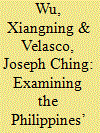

|
|
|
|
|
| Summary/Abstract |
When great powers such as the United States and China grow especially hawkish with more uncertainties, how does a smaller state react to such a complex and dangerous territorial conflict? Given the competing frames of influence between China and the United States, what are the underlying reasons for the shift in the Philippines’ foreign policy? This paper focuses on the Philippines’ changing foreign policy on the South China Sea dispute and examines the main rationale for its shift in strategy towards China. We use the perspective of neoclassical realism to unpack the constraining factors that underlie the Philippines’ domestic politics and ongoing global exigencies. With changes in its domestic politics and the security challenges posed by the evolving geopolitics of the Indo-Pacific region, the Philippines is in a difficult situation, having to choose between a territorially hostile trading partner and its historical security guarantor.
|
|
|
|
|
|
|
|
|
|
|
|
|
|
|
|
| 3 |
ID:
188431
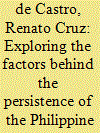

|
|
|
|
|
| Summary/Abstract |
This article examines how the Philippine-U.S. Mutual Defence Treaty (MDT) between the U.S. and the Philippines became the cornerstone of the two countries’ alliance. When the American forces withdrew from their bases in 1992 after the Philippine Senate (by a vote of 12 to 11) rejected the extension of the bases’ stay, the MDT has since served as the fallback basis of the Philippine-U.S. security relationship. However, the MDT does not spell out the details of the U.S. commitment to the Philippine defense. The MDT has been the bone of contention during the first and second decades of the new millennium, especially when China started asserting its expansive claims over much of the South China Sea. Eventually, the two allies made the necessary adjustments to transform the MDT from a mere consultative agreement to the sole bedrock of security relations. In conclusion, the article argues that the Philippines and the U.S. were able to maximize the effectiveness and relevance of their alliance by applying the Goldilocks principle—neither too cold, neither too hot—with the U.S. concretizing its security commitments to the Philippines and the two parties committing themselves together in addressing China’s maritime expansionism cautiously, reliably, and responsibly.
|
|
|
|
|
|
|
|
|
|
|
|
|
|
|
|
| 4 |
ID:
188426


|
|
|
|
|
| Summary/Abstract |
Multilateralism at the regional and global stage is essential for Indonesia’s foreign policy. Apart from ASEAN, which has long been a pivotal array for Indonesia’s regional economic interdependence and political stability, the G20 is recently added to the country’s interest. It serves Indonesia’s desire for global leadership and middle-power status. As Indonesia began its year-long presidency of the G20 in 2022, the government is confident that hosting numerous meetings and the Group’s summit at the end of 2022 is a notable milestone for its international leadership exposure. This time, Indonesia’s President Joko Widodo emphasises priority agendas: strengthening global health architecture, transitioning to green and renewable energy, and promoting the digital economy. This commentary evaluates and projects Indonesia’s G20 presidency amidst the country’s democratic decline in recent years. It argues that Indonesia’s proposed agendas are more ambitious goals than strategic. Instead, the country’s priority will be marked by a solid neoliberal economic policy and stability, which is likely to cause even more democratic setbacks at home.
|
|
|
|
|
|
|
|
|
|
|
|
|
|
|
|
| 5 |
ID:
188427
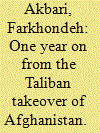

|
|
|
|
|
| Summary/Abstract |
One year on from the Taliban’s takeover, what has changed in Afghanistan? Why has re-instituting a gender apartheid regime been so central to the Taliban 2.0’s (Taliban 2.0 refers to the second version of the Taliban that came to power in August 2021. The first Taliban rule were from 1996 to 2001.) consolidation of power in Afghanistan since August 2021? We address these questions by explaining how gender has become a salient feature of multi-level power struggles in Taliban-ruled Afghanistan. First, we examine the changes experienced by women and girls over the past year under the second Taliban regime. Second, we consider four types of power struggles—in international relations, in transnational politics, within the Taliban organisation, and between Afghan men and women—that constrain the realisation of women’s rights and security. Finally, we suggest politically necessary actions for Australian Government to support the women and girls of Afghanistan in line with its value-based foreign policy and multilateral commitments.
|
|
|
|
|
|
|
|
|
|
|
|
|
|
|
|
| 6 |
ID:
188429


|
|
|
|
|
| Summary/Abstract |
This paper investigates the COVID-19 vaccine diplomacy of the United States and China in Vietnam and conceptualises Hanoi’s practical responses. The deployment of vaccine diplomacy is closely associated with US-China strategic rivalry and is thus labelled as proxy competition in this paper. This paper found that both Washington and Beijing leveraged vaccine diplomacy to achieve general strategic objectives and specific foreign policy objectives in relations with Vietnam. For the USA, vaccine donation consolidated Hanoi’s strategic trust in Washington during tough times. Meanwhile, despite widespread mistrust and suspicion regarding the quality and efficacy of Chinese-made vaccines amongst Vietnamese people, China’s vaccine donation to Vietnam could still prevent Hanoi from further spiraling into the US-led anti-China coalition. Nevertheless, Vietnam has constantly been at a crossroads, for it not only strives to respond reasonably to the USA and China at the international level but also has to accommodate the Vietnamese public’s policy preferences at the domestic level.
|
|
|
|
|
|
|
|
|
|
|
|
|
|
|
|
| 7 |
ID:
188428
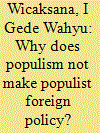

|
|
|
|
|
| Summary/Abstract |
The consequences of populism on foreign policy have been a rising topic of academic inquiry in recent years. The latest literature exposes diverse propensities in the state governments’ international behaviour led by populist leaders. In comparison, foreign policies of populists in the Americas and Europe exhibit anti-elitism and anti-pluralism toward the outside world. Those in Asia tend to be populist domestically, not in foreign policy. This article focuses on the foreign policies of Asian populist government leaders and addresses the question as to why are their foreign policies sterile from populism? It presents the case of Indonesia under President Joko Widodo (Jokowi). The argument is that the enduring pragmatism and domestic constraints have hindered Jokowi's populist motive from shaping the role of the state foreign policy as the defender of the suppressed people against the repressive elite. Hence, Jokowi is unable to make any substantial change to the foreign policy of his non-populist predecessors, and he has to maintain Indonesia’s traditional foreign policy pillars. Nevertheless, the case of Jokowi's Indonesia can open up the space to challenge the established Euro-American scholarship advancing a positive connection between leaders’ populism and foreign policy.
|
|
|
|
|
|
|
|
|
|
|
|
|
|
|
|
|
|
|
|
|